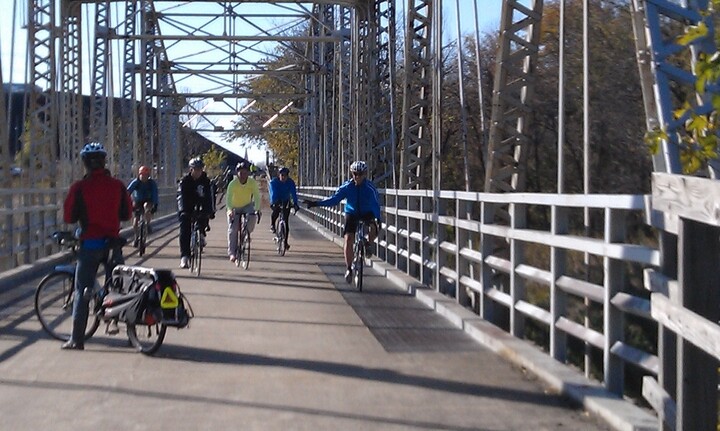What would inspire you, your family, or friends to walk or bike more within your suburban or rural community?
Could the addition of protected bike lanes, multi-use paths, or improved sidewalk connections make a difference?
Next month, one of our state’s largest sources of funding for walking and biking infrastructure projects will become available.
Starting August 1, this key funding source — the Illinois Transportation Enhancement Program (ITEP) — will be accepting grant applications for two months, divvying up $140 million in state and federal funding for walking, biking, and trail projects around the state.
To help your city or village develop a successful grant application, we have numerous resources available and are hosting a 3-part webinar series this summer with the Illinois Public Health Institute (IPHI) and Illinois Department of Transportation (IDOT).
We encourage local advocates to share these resources with their city or village staff and encourage them to apply for ITEP funding this year. (See below for more suggestions on how local advocates can help spread the word in their communities.)
WHAT CAN THE ITEP GRANT FUND?
Thanks to supporters like you who called and emailed your state legislators, we successfully waged a 2019 statewide campaign that requires the state of Illinois to dedicate $50 million per year toward walking and biking projects.
This state funding is now being distributed through ITEP, which funds projects every even-numbered year.
Projects eligible for ITEP funding include sidewalk building and replacement, pedestrian crossings, curb bump-outs, bike lanes, side paths, and trails that provide a transportation option for people walking or biking.
There is a sliding scale local match based on need, and many applicants are awarded 100 percent funding.
During the last round of funding in 2022, 73 projects were funded averaging $1.76 million per project. Here are a few projects awarded funding in the Chicago region:
- Batavia: IL Route 31 road diet
- Beach Park: Sheridan Road side path and sidewalks
- Blue Island: Western Avenue streetscape project
- Chicago: Englewood trail
- Des Plaines: S-Curve pedestrian/bicycle underpass
- Evanston: Church Street protected bike lanes
- Homewood: 183rd Street on-street bike lanes
- McHenry: IL Route 31 sidewalk and multi-use path
- Mount Prospect: Melas-Meadows pedestrian bridge
- Park Forest: Forest Boulevard multi-use path
- Skokie: Church Street bike lanes
- Oak Lawn: Wolfe Wildlife bike trail
HOW CAN LOCAL ADVOCATES HELP?
Local advocates can ensure that their village or city staff know about this grant opportunity and the available resources.
Please consider sharing this blog post with your municipal planners, engineers, administrators, and other staff and encourage them to apply for ITEP funding.
Depending on your own ability, you could even offer to help collect letters of support for the selected grant project from local community groups and businesses and help review or develop other supporting application materials.
We hope your community is able to take advantage of this important funding source this year. Dream big Illinois, and let’s make our streets safer for all!
WHAT GRANT SUPPORT IS AVAILABLE TO COMMUNITIES?
We are hosting a three-part webinar series this summer to help municipal staff develop successful grant applications.
You can view the first ITEP webinar recording and register for the final two webinars below:
- ITEP webinar part 1: ITEP basics, eligibility criteria, what’s new, and best practices
- ITEP webinar part 2: Scoring, application walk through, Q&A with IDOT staff
- Wednesday, August 21, 11:30 a.m. to 1 p.m.
- Register here
- ITEP webinar part 3: Q&A with IDOT staff
- Wednesday, September 11, 11:30 a.m. to 1 p.m.
- Register here
Additional resources are available for municipal staff at activetrans.org/ITEP, including a list of engineering firms offering pro-bono support, an opportunity for your application narrative to be reviewed, helpful templates, and an extensive frequently asked questions section.
The ITEP webinar series is made possible with funding from the Centers for Disease Control and Prevention and administered by the Illinois Public Health Institute in collaboration with partners in the Illinois Alliance to Prevent Obesity

